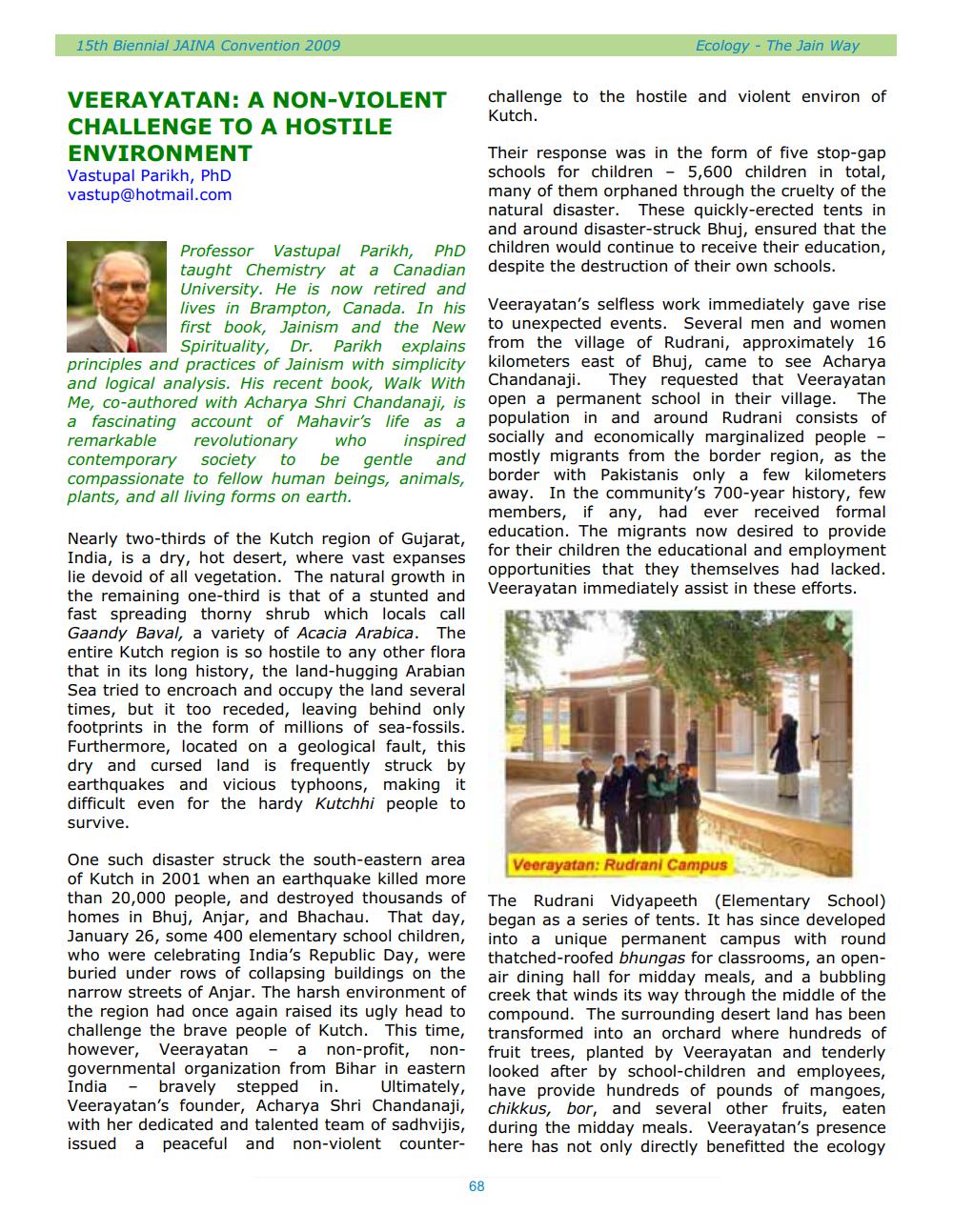________________
15th Biennial JAINA Convention 2009
VEERAYATAN: A NON-VIOLENT CHALLENGE TO A HOSTILE
ENVIRONMENT
Vastupal Parikh, PhD
[email protected]
Professor Vastupal Parikh, PhD taught Chemistry at a Canadian University. He is now retired and lives in Brampton, Canada. In his first book, Jainism and the New Spirituality, Dr. Parikh explains principles and practices of Jainism with simplicity and logical analysis. His recent book, Walk With Me, co-authored with Acharya Shri Chandanaji, is a fascinating account of Mahavir's life as a remarkable revolutionary who inspired contemporary society to be gentle and compassionate to fellow human beings, animals, plants, and all living forms on earth.
Nearly two-thirds of the Kutch region of Gujarat,
India, is a dry, hot desert, where vast expanses lie devoid of all vegetation. The natural growth in the remaining one-third is that of a stunted and fast spreading thorny shrub which locals call Gaandy Baval, a variety of Acacia Arabica. The entire Kutch region is so hostile to any other flora that in its long history, the land-hugging Arabian Sea tried to encroach and occupy the land several times, but it too receded, leaving behind only footprints in the form of millions of sea-fossils. Furthermore, located on a geological fault, this dry and cursed land is frequently struck by earthquakes and vicious typhoons, making it difficult even for the hardy Kutchhi people to survive.
One such disaster struck the south-eastern area of Kutch in 2001 when an earthquake killed more than 20,000 people, and destroyed thousands of homes in Bhuj, Anjar, and Bhachau. That day, January 26, some 400 elementary school children, who were celebrating India's Republic Day, were buried under rows of collapsing buildings on the narrow streets of Anjar. The harsh environment of the region had once again raised its ugly head to challenge the brave people of Kutch. This time, however, Veerayatan - a non-profit, nongovernmental organization from Bihar in eastern India - bravely stepped in. Ultimately, Veerayatan's founder, Acharya Shri Chandanaji, with her dedicated and talented team of sadhvijis, issued a peaceful and non-violent counter
Ecology - The Jain Way
68
challenge to the hostile and violent environ of Kutch.
Their response was in the form of five stop-gap schools for children - 5,600 children in total, many of them orphaned through the cruelty of the natural disaster. These quickly-erected tents in and around disaster-struck Bhuj, ensured that the children would continue to receive their education, despite the destruction of their own schools.
Veerayatan's selfless work immediately gave rise to unexpected events. Several men and women from the village of Rudrani, approximately 16 kilometers east of Bhuj, came to see Acharya Chandanaji. They requested that Veerayatan open a permanent school in their village. The population in and around Rudrani consists of socially and economically marginalized people - mostly migrants from the border region, as the border with Pakistanis only a few kilometers away. In the community's 700-year history, few members, if any, had ever received formal education. The migrants now desired to provide
for their children the educational and employment opportunities that they themselves had lacked. Veerayatan immediately assist in these efforts.
Veerayatan: Rudrani Campus
The Rudrani Vidyapeeth (Elementary School) began as a series of tents. It has since developed into a unique permanent campus with round thatched-roofed bhungas for classrooms, an openair dining hall for midday meals, and a bubbling creek that winds its way through the middle of the compound. The surrounding desert land has been transformed into an orchard where hundreds of fruit trees, planted by Veerayatan and tenderly looked after by school-children and employees, have provide hundreds of pounds of mangoes, chikkus, bor, and several other fruits, eaten during the midday meals. Veerayatan's presence here has not only directly benefitted the ecology
